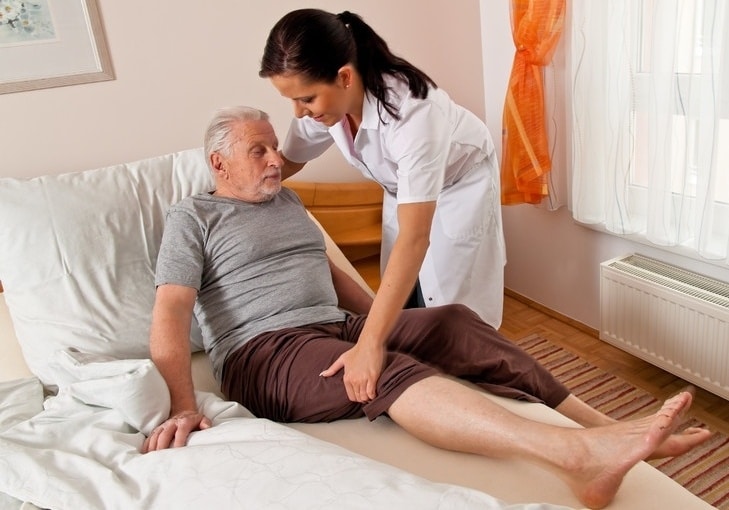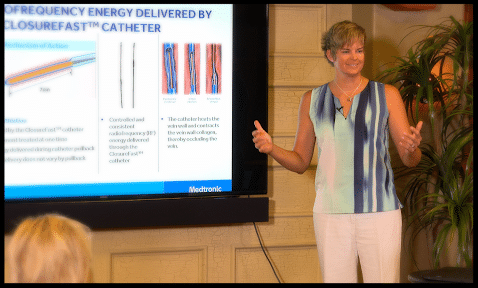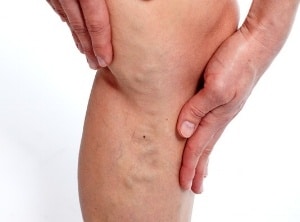Care for Nurses with Chronic Venous Insufficiency

It can hurt to care--just ask any nurse.
As a profession, nurses experience some of the highest rates of varicose veins and Chronic Venous Insufficiency (CVI) in the country. In fact, in one study by the NIH, 63 per cent of participating nurses were shown to have at least one sign of CVI.
Nurses will know that it is important to diligently practice self-care in order to minimize the discomfort of this condition. Elevating the legs, compression stockings, and engaging in calf muscle-contracting exercises such as walking are just some of the home care remedies that can provide occasional relief. As a chronic and progressive condition, the pain, fatigue and other symptoms caused by CVI are likely to worsen.
Fortunately, there are other minimally invasive treatment options that can bring relief from the pain of CVI and varicose veins. If you live and work with any of these symptoms , consider consulting a qualified vein specialist soon to ensure your vascular health is not at risk, and to learn about a treatment plan that is tailored for you.
In the meantime, compression stockings helps if you stand or sit for long periods of time. However, be careful with calf sleeves as they can sometimes cause swelling in the feet because they typically end at the ankle.
CVI risk factors for nurses
There are a number of reasons why nurses are at particular risk for development and progression of CVI. The first reason is their job requires that they stand for long periods; basically, gravity takes its toll. Activities that require standing (or even sitting) for extended periods deprive the body of the benefits of the strong calf muscle contractions produced while walking. This means the heart has to work a lot harder to push the blood through the legs and back up for reoxygenation and recirculation. Over time, the vascular system wearies and becomes less efficient.
The physical strain of the occupation is another notable contributor to the development of CVI. Nurses work long hours, carry out very physical labor, and often perform shift work. This can affect sleep and eating schedules, and these factors can have a negative effect on health, generally, leading to conditions such as insomnia and overweight.
Another factor is gender. Women dominate nursing, and estrogen, oral contraceptives and hormone replacements are known to contribute to the weakening of blood vessel walls. This stretch in blood vessels means more bulging and less efficient return of blood.
Help for nurses with CVI
The good news is that there are qualified vein specialists who care about the wellbeing of nurses. Jilanne Rose is one such specialist. As a board certified doctorate nurse practitioner, she understands the special needs of nurses. Trained by three top Arizona vein specialists-an interventional cardiologist, a cardiothoracic surgeon, and an interventional radiologist-she has completed over 10,000 peripheral vein procedures, and is known for her compassionate care and exceptional outcomes.
If you are experiencing any of the symptoms of CVI, consider consulting with Jilanne today to find out how she can have you back on your feet and doing the work you love, more comfortably, in remarkably little time.
Is there anything worse than itchy varicose veins? Maybe, but itchy veins remains high on the list of issues we would love to resolve before they drive us crazy. If you are experiencing itching around your varicose veins, it could be a message from your body that it is time to have your veins checked…
Read MoreThe full story on Chronic Venous Insufficiency, what it is and how to treat it. A video presentation by Jilanne Rose, DNP-C, Clinical Director. Run Time 24:46. TRANSCRIPT What’s the Difference Between Veins and Arteries? When we talk about vascular health and vascular disease most people think about arteries. When we talk about the…
Read MoreA group of Gilbert Arizona Residents concerned about Chronic Venous Insufficiency gathered on Saturday July 16th for an interactive discussion on CVI symptoms, causes and treatments. Chronic Venous Insufficiency, Venous Reflux Disease and Varicose Veins affect over 30 million American men and women. Unfortunately, many do not get treated as they believe varicose veins are…
Read MoreCan Chronic Venous Insufficiency (CVI) be reversed? Unfortunately the short answer to this question is no; but CVI can be treated with minimally invasive procedures which can reduce symptoms and improve quality of life tremendously! Chronic Vein Insufficiency Causes In order to understand why venous insufficiency or peripheral venous insufficiency cannot be reversed, we must…
Read MoreWhat can you do to treat bleeding varicose vein and spider veins? First and foremost, don’t panic. Although the visual effect of a ruptured varicose vein or bleeding vein can be alarming, there are some simple things that can be done to get the bleeding to stop. If you can reach the area that is…
Read MoreWhy are varicose veins painful? The discomfort associated with varicose veins is caused by a combination of factors. When veins are weak, the blood which is supposed to return to the heart in a timely fashion, settles and pools in the superficial vein system. This pooling of blood worsens when patients stand or sit in…
Read MoreEndovenous Ablation Definition Taken literally, endovenous ablation is the removal of a vein from within. ‘Endo’ means internal or inside, ‘venous’ refers to a vein, and ablation is to ‘remove’. In the instance of veins, it is no longer necessary to physically remove a vein from the leg (vein stripping) to improve symptoms or the…
Read MoreThe newest procedure for the treatment of varicose veins was approved by the FDA about two years ago. It is what has been termed a non-tumescent non-thermal therapy. What this means is that it does not require a lot of numbing medicine to complete, and it does not use a heating element to close or…
Read MoreWhat is the best treatment for varicose veins? No varicose vein is the same; no person’s symptoms are the same; and so the best procedure for varicose veins is not always the same. The treatments associated with vein disease are based on a patient’s symptoms, vein size, location, contributing conditions, and ultrasound findings. Different…
Read More

